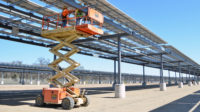Construction Leads South Africa's Job Growth, Says Latest Report

South Africa's construction sector led the country's third-quarter job growth due to the expansion of a government-financed public-works program and the government's backing of a renewable-energy build plan.
Statistics South Africa, the country's economic data collection service, says 99,000 of 116,000 jobs created in the three-month period ended Sept. 30 were in construction.
The quarterly labor-force survey, released late last month, also said that, since the same period in 2013, the industry gain of 135,000 jobs was the second-highest increase, following the 140,000 jobs created in the community and social services sector.
Overall, South Africa's unemployment rate decreased slightly, to 25.4% in the third quarter from 25.5% in the second.
Most construction jobs were created under President Jacob Zuma’s expanded public-works program, which is credited for creating 973,705 short- to medium-term jobs in the 2012-13 period.
The program's third phase, launched in April, is targeted to create six million similar jobs over the next five years.
National Treasury Director General Lungisa Fuzile said South Africa's 2014 public infrastructure investment will be 10% of the country's GDP and financed through tariffs, public-private partnerships, taxes and loans, with an emphasis on transport, energy and water sectors.
Public-sector investment will total $75.1 billion this year.
The country's so-called Renewable Energy Independent Power Producer Procurement Program, launched in 2011, has generated private-sector investment of some $10.6 billion in solar, wind, hydroelectric and biomass-based technologies and projects.
Most powerplants will be located in rural areas, and about 20,000 jobs will be created in the construction phase, with another 35,000 jobs in plant operations, say the country's energy and financial agencies.
Construction job creation also has been boosted by the execution of power megaprojects, such as the 4,800-MW Medupi and the 5,400-MW Kusile coal-fired power stations, the upgrading of coal, iron ore and manganese production, and implementation of 29 large water-supply schemes.
While large South African construction companies—Murray & Roberts, WBHO, Aveng, Group Five, Raubex, Stefanutti Stocks, Basil Read, Calgaro, Esorfranki and Protech, among them—have dominated the public-works expansion program, international energy developers are said to be driving the renewable-energy build in South Africa.
Analysts say South Africa's construction market is set to reach a predicted 3.4% year-on-year growth in 2014.
An early October report in Business Monitor International notes Zuma's "plans in the pipeline" for large infrastructure investments, such as a new port expansion in Durban, and points to new government legislation that would fast-track such projects and address past financing challenges.





